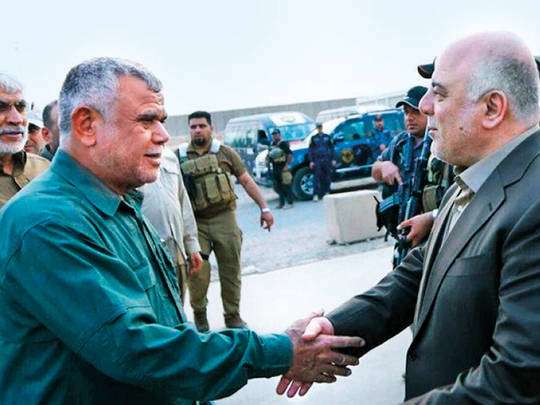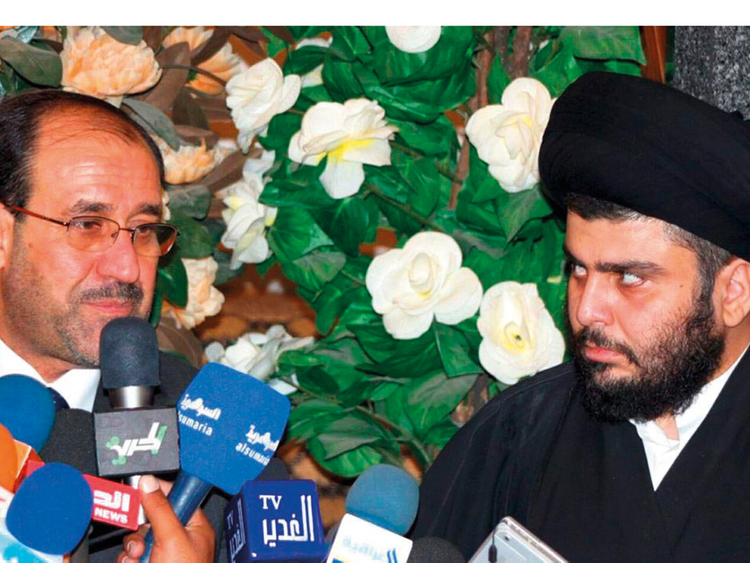
DUBAI: In just three years, the Iraqi Prime Minister, Haider Al Abadi, has rebuilt the army, defeated Daesh and restored sovereignty across the deeply divided nation, accomplishments that, in the eyes of many, give him the stature of an Iraqi Abraham Lincoln.
Still, as he is quick to warn in weekly addresses to the nation, stability remains fragile.
The country is coping with an ever-bubbling threat of violent sectarianism between the Shiite and Sunni populations — as well as endemic government corruption and overwhelming economic despair, especially among millions of citizens left homeless after the battles against Daesh.
This is a crucial moment for Iraq, as it gears up for an election that could unravel its hard-fought gains. The vote could also reshape the influence of Iran across the Middle East and determine the likelihood of a resurgent Daesh.
But it’s an important moment for Al Abadi, too. He has never spearheaded an electoral campaign, and has already stumbled as he tries to negotiate the mind-numbing complexities of Iraqi politics for a vote that will test his own political acumen in a challenging security environment.
Last, for example, before the deadline to register for the May 12 elections, the prime minister tripped on an obvious landmine. He welcomed the leaders of Iranian-backed Shiite militias into a grand coalition that he hoped would cement his image as a moderating figure who could reach beyond his own Shiite base to appeal to Iraq’s other communities.
Iraq’s Shiites, although the majority, are fractured into competing political parties. Since Saddam Hussain’s ouster in 2003, Shiite coalitions have run the government, a formula still considered key in this election.
The backlash to Al Abadi’s move was swift.
The Iranian-backed Shiite militias have won praise for helping defeat Daesh, but they have also been accused in sectarian atrocities and their leaders are seen by many as tools of Iran. Sunni and Kurdish leaders were furious. Even a Shiite leader, Moqtada Al Sadr, a possible kingmaker in this vote, called the alliance “abhorrent.”
Within 24 hours, Al Abadi had reversed himself, and the militia leaders left the coalition.
Al Abadi’s blunder was a stark reminder of the fact that, with the election still more than three months out, nothing can be taken for granted.
While he is still Iraq’s most popular politician and front-runner, Al Abadi’s clumsy outreach and deal-making have compounded his difficulties, alienating the influential factions he needs to win.
“Al Abadi has a narrow line to walk,” said Renad Mansour, an Iraq analyst at Chatham House. “He is popular among many types of Iraqis, but he also has serious enemies. Politics is about shared power in Iraq.”
Al Abadi took power in 2014, shortly after the devastating Daesh blitzkrieg occupied one-third of Iraq and enslaved tens of thousands of his countrymen. Most Iraqis attribute that disaster to the failings of his predecessor, Nouri Al Maliki, who ruled for eight years before being ousted by his own Shiite coalition in favour of Al Abadi.
But while Al Abadi is the leader of the nation, he does not head his own political party, the Islamic Dawa — making his political position precarious. The party’s leader remains Al Maliki, who despite his checkered political past is itching for a comeback.
So in a classic example of the serpentine nature of Iraqi politics, Al Maliki has blocked Al Abadi from using Dawa resources for his campaign.
Al Abadi created his own coalition, the Victory Alliance, the one to which he first welcomed, then removed, the pro-Iranian militia leaders. The coalition immediately attracted dozens of national and regional politicians from across sectarian lines, giving his aides confidence in a strong platform to enter the election season.
Iraq’s postwar political realities have reserved the position of prime minister for a Shiite. Given the country’s history of tight elections and coalition governments in the three national polls since Saddam Hussain’s ouster in 2003, Al Abadi needs an alliance with at least one of three major bulwarks of Shiite political power to win, analysts say. (The largely ceremonial presidency is held by a Kurd, and the speaker of Parliament is a Sunni.)
The problem is that these Shiite powers all have their own baggage. One is Al Maliki, a politically damaged rival who wants the job himself. Another is the pro-Iranian militia leaders, who are close to Iran’s Revolutionary Guards, a liability that has already backfired on Al Abadi.
And the third is Al Sadr, a populist firebrand who has become a champion of the poor and unemployed and a fierce opponent of Iranian meddling.
Al Sadr, best known to Americans as the thuggish militia leader who for years after the United States invasion fought and killed Americans, has become a pro-Arab, anti-Iranian nationalist. He is running his own coalition which, like Al Abadi’s, is cross-sectarian. It includes Sunni leaders who welcome Al Sadr’s anti-Iran message.
Politicians close to Al Abadi had been in exploratory talks with Al Sadr’s followers about joining with them in a possible coalition. It is not clear why those talks foundered, but Sadrists say their leader was angered by Al Abadi’s alliance with the pro-Iranian militia leaders.
Even Al Abadi’s closest advisers now concede that alliance was a serious tactical error, which they attribute to the overwhelming task of setting up a new political entity on short deadline.
Registration for the election ended on January 15.
“We did not have time to finalise who our main partners would be, what we stand for and what we all agree with,” said Ali Al Adiib, a member of Parliament close to Al Abadi. “We are discussing all these things now.”
Some analysts say the prime minister’s reputation may be forever tarnished.
On January 21, Iraq’s Supreme Court ruled that a delay would be unconstitutional.
Wathiq Al Hashimi, the head of the Iraqi Group for Strategic Studies, believes that, despite the challenges, Al Abadi has the best chances of victory for a simple reason: the optimism he restored to Iraqis after beating back Daesh.
“The path for Al Abadi’s second term will be one strewn with flowers,” he said.













